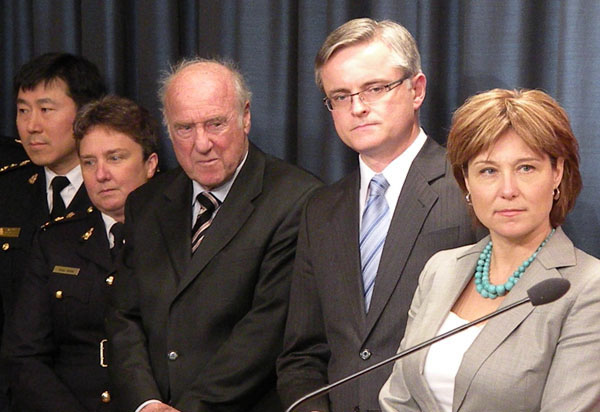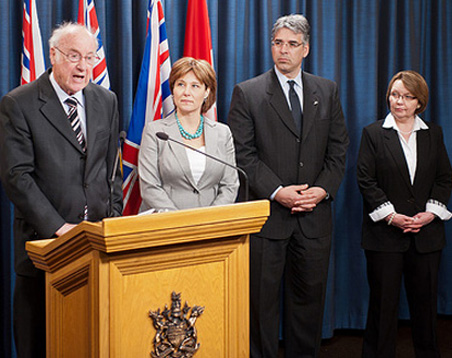Thomas Braidwood sells out
His support notwithstanding,
B.C.’s new Independent Investigations Office
isn’t what he recommended
Originally posted May 17, 2011
Thomas Braidwood (centre) poses with Vancouver police chief Jim Chu,
North Vancouver RCMP Supt. Tonia Enger, B.C. Attorney General Barry Penner
and Premier Christy Clark to make a mockery of his own work.
Photo: Tom Fletcher, Black Press.
Like Thomas Braidwood, B.C. Police Association president and lobbyist
Tom Stamatakis fully supports this BC Liberal manoeuvre.
Photo: Christy Clark tweet.
Endorsing the death of police accountability, Thomas Braidwood poses for
a government photograph with B.C. premier Christy Clark and Tom Stamatakis,
a lobbyist for the Vancouver Police Union, the B.C. Police Association
and the Canadian Police Association.
Photo: B.C. government.
After a year-long delay, the provincial government announced today it will create a civilian agency to investigate serious allegations against police. But its press release shows the B.C. Liberal government has thwarted a key recommendation from Thomas Braidwood. This is potentially serious enough to defeat the cause of police accountability in B.C. But that doesn’t bother Braidwood at all. In fact, along with Vancouver police chief Jim Chu, North Vancouver RCMP Supt. Tonia Enger and Attorney General Barry Penner, Braidwood was present at Premier Christy Clark’s press conference.
What accounts for Braidwood’s disgraceful about-face? I think somebody got to him. This really stinks.
Following his inquiry into Robert Dziekanski’s Taser-related death at the hands of four RCMP officers, Braidwood recommended B.C. create a civilian agency called the Independent Investigation Office to investigate serious police incidents. Braidwood wanted the agency modelled after Ontario’s Special Investigations Unit and he emphasized that the new agency should be answerable to B.C.’s Ombudsperson. Braidwood no doubt knew that it took a lengthy investigation and a scathing report from Ontario’s Ombudsman to keep the SIU from becoming an apologist for the police.
But the government announced today that the IIO will report to the Attorney General (and therefore not the Ombudsperson, a crucial point that the mainstream media will miss). Having the IIO report to the AG is disturbing for a number of reasons. To give just one example, it was the AG’s Crown attorneys who exonerated the four Mounties involved in Dziekanski’s death. That was what led to Braidwood’s inquiry in the first place. Furthermore by having the IIO answer to a government department, there’s always the possibility of political interference in its work.
The government announcement adds that “the Office of the Police Complaints [sic] Commissioner, an independent officer of the legislature, will investigate incidents or complaints that involve investigative staff from the Independent Investigations Office.”
That largely puts the IIO under the jurisdiction of ex-cops. Almost all the senior positions at the OPCC are staffed by former police officers. An exception is police complaint commissioner Stan Lowe. But Lowe is a former Crown attorney and member of the Criminal Justice Branch executive management that unanimously decided to exonerate the four RCMP officers involved in Robert Dziekanski’s Taser-related death. It was Lowe who made the infamous December 2008 announcement that the five Taser shocks inflicted on Dziekanski were “reasonable and necessary.”
Lowe and his staff answer to no one — not the Ombudsperson nor anyone else. There’s no way to determine how they handle their own responsibilities.
Consider, for example, the incident in which a Vancouver police officer pushed a handicapped woman to the ground.
That took place on June 9, 2010. Yet it didn’t become public knowledge until over six weeks later, when the B.C. Civil Liberties Association released surveillance video and the media reported the story. Vancouver police and the OPCC then acknowledged that they learned about the incident soon after it occurred. So why did it take more than six weeks to make a public announcement, transfer the officer out of the neighbourhood and call in an outside police force to investigate?
Now we’re told the OPCC, not the Ombudsperson, will ensure the IIO acts with transparency.
What else could go wrong for the new agency? The government could neuter the IIO by starving it of funding, staffing it with people close to the police or writing ineffective legislation.
One positive note is that the IIO will have the power to investigate B.C.’s RCMP officers, who currently come under federal jurisdiction. But will that really change anything?
One can’t help wondering — because without an Ombudsperson’s oversight there’s little to keep B.C.’s new police watchdog from becoming a police lapdog.
As for Thomas Braidwood, he’s this year’s top candidate for the Richard Peck Award for Legal Establishment Integrity, awarded by B.C.’s Criminal Justice Branch on the anniversary of Dziekanski’s death.
And, by the way, police will continue to investigate police involved in “less serious” incidents — with the OPCC helping cops rationalize, excuse or cover up police misconduct.
The police status quo shall prevail
A summary of how the government has evaded
the letter and intent of Braidwood’s recommendations
The IIO will not answer to the Ombudsperson, removing any real hope of transparency.
The IIO’s transparency will be limited to an IIO “monitor” who will be able to review its investigations. But the IIO monitor will be appointed by the IIO director.
The IIO will answer to the Attorney General, leaving it open to political interference.
The IIO director won’t be able to lay criminal charges against police, as Ontario’s SIU director does. The IIO will simply present evidence to Crown attorneys, who have been notoriously reluctant to charge police.
B.C.’s Office of the Police Complaint Commissioner, a product of police culture, will hold the power to investigate the IIO. No one holds the power to investigate the OPCC.
The IIO won’t be able to investigate allegations of sexual assault by police. In B.C., only police can investigate police for sexual assault.
Meanwhile police will continue to investigate police accused of misconduct and “less serious” injuries. Their investigations will continue to be reviewed by Stan Lowe and his crew of ex-cops at the OPCC.
Postscript:
Why did Braidwood sell out?
B.C. evidently has an especially close-knit establishment that differs, at least on police matters, from its counterpart in Ontario. Braidwood is very much part of the province’s legal elite, which includes such men of integrity as Dirk Ryneveld, Richard Peck and Stan Lowe himself. They have a lot in common, including the fact that they (and often their families) depend on the government and its agencies for very lucrative jobs, appointments, commissions and contracts.
Whoever runs the government listens to an especially powerful police lobby — I think that’s indicated by the fact that both the BC Liberals and the NDP, despite being at war on every other important issue, agree entirely about police issues. The B.C. Civil Liberties Association is compromised by establishment ambitions. With very few exceptions, our mainstream media couldn’t care less.
Read more about B.C.’s inadequate Independent Investigations Office
Read more about Stan Lowe and the OPCC
Go to News and Comment page


